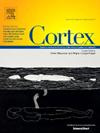Spatial working memory predicts re-cancellation behaviour in neglect
IF 3.2
2区 心理学
Q1 BEHAVIORAL SCIENCES
引用次数: 0
Abstract
The lateralised bias of spatial neglect can be modulated by concurrent non-lateralised impairments. For instance, people with left neglect may have spatial working memory deficits that prevent them from keeping track of locations visited in visual search tasks such as target cancellation. Not only do they omit targets in some parts of the array but they may revisit and re-cancel targets in other parts, and this re-cancellation behaviour increases dramatically in ‘invisible’ conditions, in which touching a target leaves no visible trace. It has been proposed that spatial memory deficits are the main reason for the rise of re-cancellation errors in invisible cancellation conditions. This idea predicts that spatial memory abilities should correlate with re-cancellation behaviour; but this expected relationship has never been demonstrated. The present study takes an exploratory approach to describing the behaviour of 18 people with left visual neglect, following right hemisphere stroke, on touchscreen tests of spatial working memory and target cancellation. We show that people with neglect who are less able to remember locations in a spatial memory task tend to make more re-cancellation errors in invisible cancellation conditions. We also describe an apparent trade-off, in which some people with neglect make many more re-cancellation errors, whilst others make many more target omissions. We suggest that the influence of spatial memory deficits on invisible cancellation tasks can be more fully captured by considering both types of errors, rather than re-cancellations only.
空间工作记忆预测忽视中的再取消行为。
空间忽视的侧偏性可以通过并发的非侧偏性损伤来调节。例如,患有左忽视的人可能有空间工作记忆缺陷,这使他们无法在视觉搜索任务(如目标取消)中跟踪所访问的位置。它们不仅会忽略阵列中某些部分的目标,还可能重新访问并重新取消其他部分的目标,并且这种重新取消行为在“不可见”条件下急剧增加,在这种情况下,接触目标不会留下可见的痕迹。有研究认为,空间记忆缺陷是隐性消去条件下重消错误增加的主要原因。这一观点预测空间记忆能力应该与再取消行为相关;但这种预期的关系从未得到证实。本研究采用一种探索性的方法来描述18名右半球中风后左视觉忽视患者在空间工作记忆和目标取消的触摸屏测试中的行为。我们发现,在空间记忆任务中,被忽视的人在记忆位置的能力较差,在看不见的取消条件下,他们往往会犯更多的再取消错误。我们还描述了一种明显的权衡,在这种权衡中,一些被忽视的人会犯更多的重消错误,而另一些人则会犯更多的目标遗漏。我们建议空间记忆缺陷对无形取消任务的影响可以通过考虑两种类型的错误而不是仅仅重新取消任务来更充分地捕捉。
本文章由计算机程序翻译,如有差异,请以英文原文为准。
求助全文
约1分钟内获得全文
求助全文
来源期刊

Cortex
医学-行为科学
CiteScore
7.00
自引率
5.60%
发文量
250
审稿时长
74 days
期刊介绍:
CORTEX is an international journal devoted to the study of cognition and of the relationship between the nervous system and mental processes, particularly as these are reflected in the behaviour of patients with acquired brain lesions, normal volunteers, children with typical and atypical development, and in the activation of brain regions and systems as recorded by functional neuroimaging techniques. It was founded in 1964 by Ennio De Renzi.
 求助内容:
求助内容: 应助结果提醒方式:
应助结果提醒方式:


